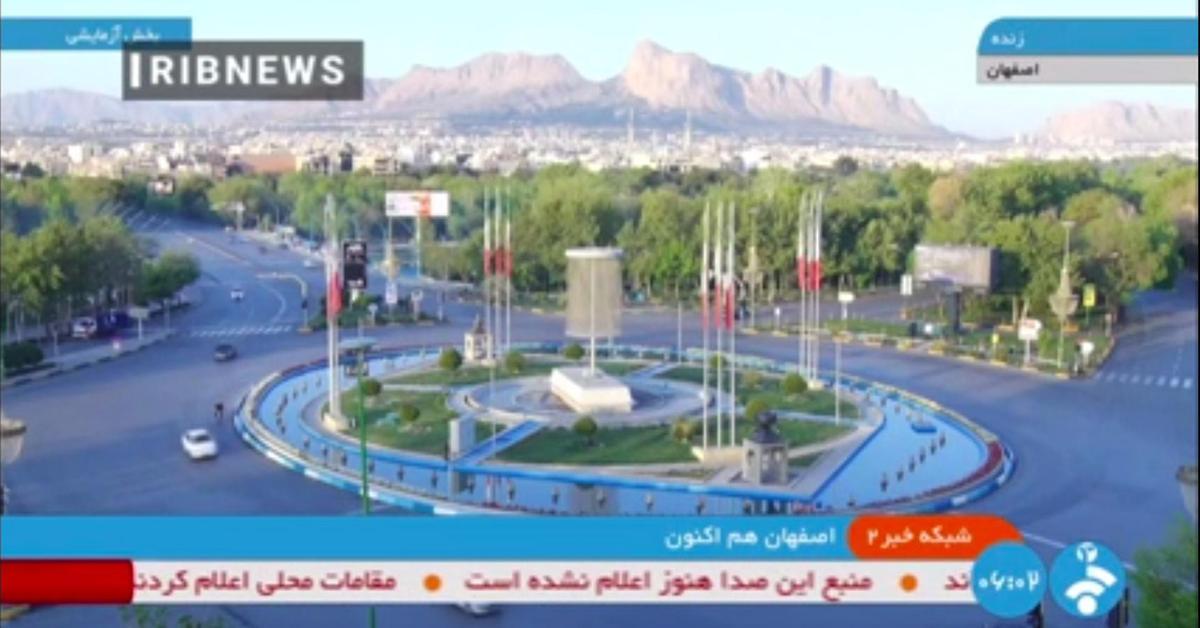
An attack attributed to Israel has forced Iran to activate its air defenses during the early hours of the morning. The offensive would have consisted of the launch of several missiles in the province of Isfahan – where one of Iran’s nuclear facilities is located – in retaliation for the attack suffered last Saturday, according to first information.
There is no official confirmation from these countries, but it has been acknowledged, first of all, by senior US officials to the US media. Later, an Israeli official admitted responsibility for the offensive Washington Posty has stated that it was aimed “to show Iran that Israel has the ability to attack inside the country.”
Iran denied this Friday that a missile attack had occurred and has assured, instead, that air defenses have shot down several drones. “So far no large-scale impact or explosion caused by any aerial threat has been reported,” the state agency IRNA has said. The agency has explained that air defenses have been activated in “several provinces” after “loud explosions” were heard in the center of the country.
“Iran’s response has already been seen”
Iranian state television has provided similar information and shows images of apparent normality in the city of Isfahan. The Iranian Space Agency has also denied a missile attack, contrary to information from the United States that Israel had launched projectiles against Iranian soil. “There are no reports of a missile attack for now,” Iranian Space Agency spokesman Hossein Dalirian said on his X social media account, indicating that the country’s air defenses have shot down “three micro drones.” .
On the other hand, a senior Iranian official has assured Reuters that the country has no plan to take immediate retaliation against Israel. “The external origin of the incident has not been confirmed. We have not received any external attack, and the discussion is leaning more towards infiltration than attack,” this anonymous source told the agency.
The Iranian Army has also hinted that it will not respond to this attack. “Thanks to our surveillance, flying objects were fired upon,” the commander-in-chief of the Iranian Army, Major General Abdul Rahim Mousavi, told the Iranian agency Defa Press, which specializes in defense. When asked if Iran will respond to the aggression, Mousavi stated: “Iran’s response has already been seen,” in an apparent allusion to last Saturday’s attack on Israel.
The Army has insisted that the explosions heard this morning were the result of “fire from Isfahan’s defense systems.” “We have had no damage or accidents,” stressed the commander of the Iranian Army in the province of Isfahan, Siavosh Mihan-Dust.
Explosions in Isfahan, province with nuclear facilities
The attack on Iran occurred early Friday morning in the province of Isfahan, according to the explanation of officials from President Joe Biden’s Administration, cited by the ABC media. The impacts would have occurred in the province of Isfahan, where Natanz is located, the area where one of Iran’s nuclear facilities is located. “The nuclear facilities in the province of Isfahan are completely safe,” said the Tasnim agency, linked to the Revolutionary Guard, the body in charge of the security of the country’s atomic centers.
For its part, the International Atomic Energy Agency (IAEA) also confirmed this Friday that there was no damage to Iran’s nuclear facilities after the attack. “The IAEA can confirm that there is no damage to Iran’s nuclear facilities,” its director general, Rafael Grossi, said in a tweet.
The international organization has, however, asked “everyone for extreme restraint” and has reiterated “that nuclear facilities should never be a target in military conflicts.” “The IAEA is monitoring the situation very closely,” he notes.
A military source told the US network Fox that the attack has been “limited.” Furthermore, as a senior US official explained to NBC, the United States was not involved in the attack on Iran and Israel notified Washington before carrying it out.
“Israel’s counterattack against Iran is also directed against a military site and calibrated to prevent damage and new Iranian aggression. As long as Iran continues to deny the attack and divert attention from it and no further impacts are seen, there is room for both sides to back off,” said Sanam Vakil, director of the Middle East and North Africa program at the think tank Chatham House.
Meanwhile, Syria accused Israel this Friday of carrying out a new missile attack against the south of its territory, a common event but one that coincides with the series of explosions that occurred in Iran. “At around 2:55 (23:55 Thursday GMT), the Israeli enemy launched a missile attack from the northern direction of occupied Palestine against places of our anti-aircraft defense in the southern region,” the Syrian Ministry of Defense reports in a statement, which quotes an unnamed military source. According to the note, the action has caused material damage, with no casualties reported.
After the barrage of drones and missiles launched by Iran on Israel last Saturday – most of them shot down –Washington and other world powers have pressured Tel Aviv not to respond, or to ensure that any further retaliation was limited to avoid a wider conflagration following the latest spike in violence sparked by the airstrike on the embassy compound. Iranian in Damascus on April 1, attributed to Israel, in which seven members of the Iranian Revolutionary Guard were killed.
Amid confusion over what is happening, Iranian aviation authorities suspended flights in at least three cities in the country, including Tehran and its international airport. Iran has already reopened airports, including the two airfields in the capital.
Source: www.eldiario.es

